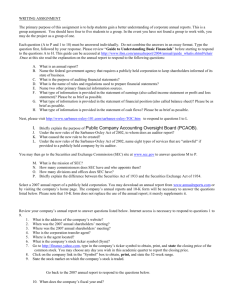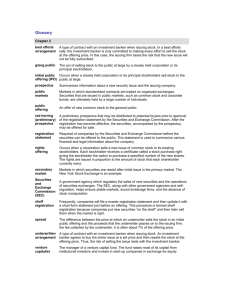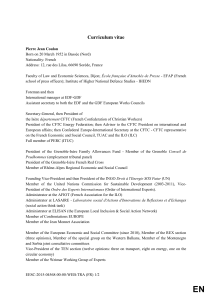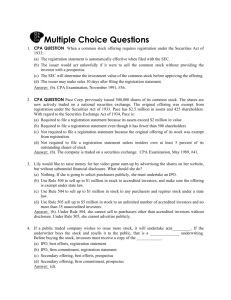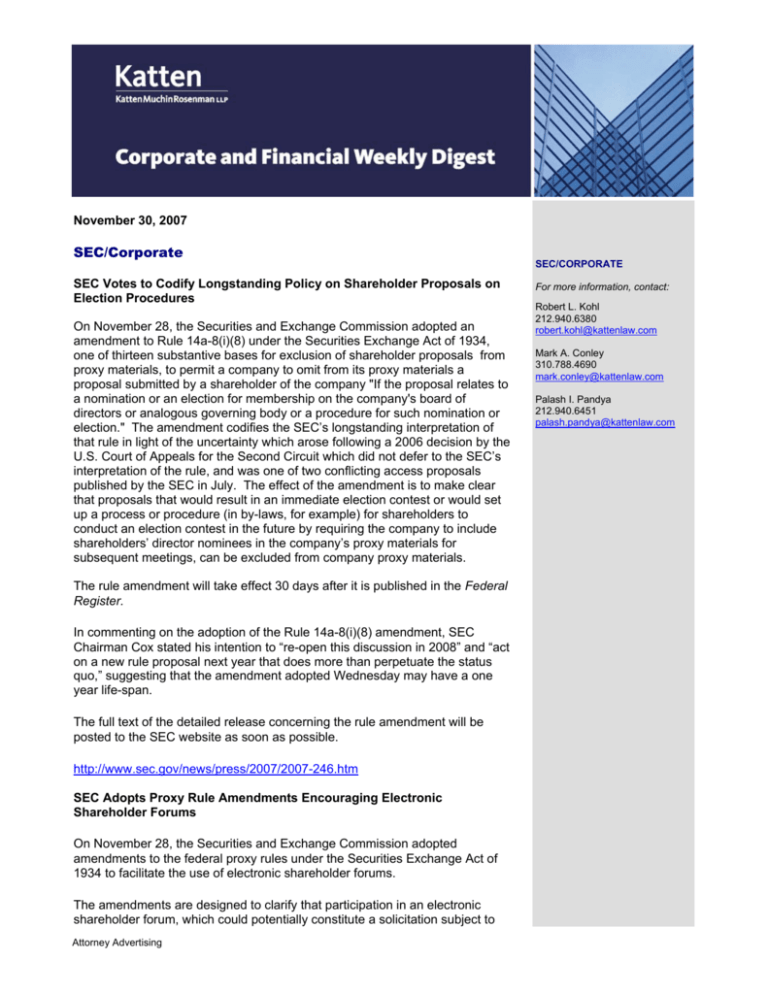
November 30, 2007
SEC/Corporate
SEC Votes to Codify Longstanding Policy on Shareholder Proposals on
Election Procedures
On November 28, the Securities and Exchange Commission adopted an
amendment to Rule 14a-8(i)(8) under the Securities Exchange Act of 1934,
one of thirteen substantive bases for exclusion of shareholder proposals from
proxy materials, to permit a company to omit from its proxy materials a
proposal submitted by a shareholder of the company "If the proposal relates to
a nomination or an election for membership on the company's board of
directors or analogous governing body or a procedure for such nomination or
election." The amendment codifies the SEC’s longstanding interpretation of
that rule in light of the uncertainty which arose following a 2006 decision by the
U.S. Court of Appeals for the Second Circuit which did not defer to the SEC’s
interpretation of the rule, and was one of two conflicting access proposals
published by the SEC in July. The effect of the amendment is to make clear
that proposals that would result in an immediate election contest or would set
up a process or procedure (in by-laws, for example) for shareholders to
conduct an election contest in the future by requiring the company to include
shareholders’ director nominees in the company’s proxy materials for
subsequent meetings, can be excluded from company proxy materials.
The rule amendment will take effect 30 days after it is published in the Federal
Register.
In commenting on the adoption of the Rule 14a-8(i)(8) amendment, SEC
Chairman Cox stated his intention to “re-open this discussion in 2008” and “act
on a new rule proposal next year that does more than perpetuate the status
quo,” suggesting that the amendment adopted Wednesday may have a one
year life-span.
The full text of the detailed release concerning the rule amendment will be
posted to the SEC website as soon as possible.
http://www.sec.gov/news/press/2007/2007-246.htm
SEC Adopts Proxy Rule Amendments Encouraging Electronic
Shareholder Forums
On November 28, the Securities and Exchange Commission adopted
amendments to the federal proxy rules under the Securities Exchange Act of
1934 to facilitate the use of electronic shareholder forums.
The amendments are designed to clarify that participation in an electronic
shareholder forum, which could potentially constitute a solicitation subject to
Attorney Advertising
SEC/CORPORATE
For more information, contact:
Robert L. Kohl
212.940.6380
robert.kohl@kattenlaw.com
Mark A. Conley
310.788.4690
mark.conley@kattenlaw.com
Palash I. Pandya
212.940.6451
palash.pandya@kattenlaw.com
the current proxy rules, will be exempt from most of the proxy rules if the
conditions to the exemption are satisfied. In summary:
•
Any participant in an electronic shareholder forum will be able to rely
on the new exemption so long as his or her communications occur
more than 60 days prior to the date announced by the company for its
annual or special meeting of shareholders, and the communicating
party does not solicit proxy authority while relying on the exemption. A
participant in an electronic shareholder forum will be eligible to solicit
proxy authority after the date that the exemption is no longer available,
provided that the solicitation is conducted in accordance with
Regulation 14A.
•
Where the company announces a meeting of shareholders less than
60 days before the meeting date, the solicitation could not occur more
than two days following the company's announcement.
In addition, new Rule 14a-17 under the Exchange Act provides that a
shareholder, company, or third party acting on behalf of a shareholder or a
company, that establishes, maintains or operates an electronic shareholder
forum will not be liable under the federal securities laws for any statement or
information provided by another person participating in the forum.
The rule amendments will take effect 30 days after they are published in the
Federal Register.
The full text of the detailed release concerning the rule amendment will be
posted to the SEC website as soon as possible.
http://www.sec.gov/news/press/2007/2007-247.htm
Broker Dealer
BROKER DEALER
FINRA Proposes Guidelines on International Prime Brokerage
In Regulatory Notice 07-58, the Financial Industry Regulatory Authority
(FINRA) proposed guidelines for International Prime Brokerage. International
Prime Brokerage is when a foreign domiciled customer (PB Customer) uses a
foreign broker-dealer as its prime broker (FPB), and the FPB has an affiliate or
correspondent relationship with a FINRA member (IPBC) to carry and clear
trades of the PB Customers of the FPB that are executed by another FINRA
member (EB). The proposed guidelines closely track the Securities and
Exchange Commission January 25, 1994 prime broker no-action letter.
Among other things, the proposed guidelines recommend an omnibus cash
account agreement between the FPB and IPBC for all trades of the PB
Customers. The EB confirms trades through OmgeoTrade Suite/CNS
Interface for Prime Brokers to the IPBC as well as sending an SEC Rule 10b10 confirmation to the PB Customers. The IPBC should contract with EB along
the lines set forth in SIFMA Form 150, and the EB and its PB customers
should contract along the lines set forth in SIFMA Form 151. Agreements
between the FPB and its PB Customers as well between the FPB and the
IPBC are also recommended. The IPBC should have net capital of at least
$1,500,000, and the EB or its clearing firm should have net capital of at least
$1,000,000.
http://www.finra.org/web/groups/rules_regs/documents/notice_to_members/p0
37521.pdf
For more information, contact:
James D. Van De Graaff
312.902.5227
james.vandegraaff@kattenlaw.com
Daren R. Domina
212.940.6517
daren.domina@kattenlaw.com
Patricia L. Levy
312.902.5322
patricia.levy@kattenlaw.com
Morris N. Simkin
212.940.8654
morris.simkin@kattenlaw.com
Janet M. Angstadt
312.902.5494
janet.angstadt@kattenlaw.com
Lance A. Zinman
312.902.5212
lance.zinman@kattenlaw.com
NYSE Proposes NYSE MatchPoint Automated Order Execution
The New York Stock Exchange LLC has proposed a new Rule 1500 creating
NYSE MatchPoint (MatchPoint). MatchPoint will be open for order entry
between 3:30 A.M. to 4:45 P.M., New York City time. NYSE Members,
member organizations and sponsored participants may enter orders in round
lot amounts for securities listed on the NYSE, Amex, Nasdaq or a regional
exchange. Orders will be designated to a specific MatchPoint matching
system that operates in one minutes integrals at 9:45 A.M., 10:00 A.M., 11:00
A.M., 12:00 P.M, 1:00 P.M., 2:00 P.M., 3:00 P.M., and 4:45 P.M. The
MatchPoint reference price for order execution during market hours is the
midpoint of the national best bid and offer. The after hour matching session
will use the closing price of the security’s primary trading market. In the case
of a locked market the locked price will be the execution price. In the case of a
crossed market the orders will not be executed. In the after hour session if the
last sale price is 2% more or less than the closing price no orders will be
executed.
In each matching session the aggregate buy orders and sell orders for a
security will be determined and executed pro-rata, rounded down to the next
round lot. Unexecuted orders or unexecuted parts of orders in a matching
session will be returned to the entrant as unexecuted and may be entered in a
subsequent matching session. Buy and sell orders entered in the same
security by the same participant may, if so designated, offset each other before
determination of the pro rata matching percentage. A participant may set
minimum order execution for a matching session –e.g., no less than $50,000 in
any share and may fix money limits -e.g., no buy or sell if the net difference is
over a certain amount – e.g., one million dollars. NYSE will report all trades in
a security in a matching session at one price for the total quantity matching.
NYSE will compare executed trades and report them to the National Securities
Clearing Corporation for clearance and settlement as well as to the entering
parties. However, NYSE will not identify the counter-party in MatchTrade to
the other side. Match Point is an anonymous trading facility.
MatchPoint rules set out procedures and requirements for non-member firms
and others to become participants in MatchPoint. MatchPoint orders are
entered using either an electronic Financial Information eXchange or an
internet based password protected order entry application.
http://a257.g.akamaitech.net/7/257/2422/01jan20071800/edocket.access.gpo.
gov/2007/pdf/E7-22782.pdf
SEC Approves Cross Listing of Options Not Meeting Original Listing
Requirements
The Securities and Exchange Commission has approved rule amendments
filed by the Chicago Board Options Exchange, Philadelphia Stock Exchange
and NYSE Arca Inc. (together Exchanges) to allow listing of options on issues
that fail to meet the original listing requirements of the Exchanges, if the
options are listed on another securities exchange and the underlying security
meets the continued listing requirements of the Exchanges, respectively.
Under the previous rules, if the underlying security failed to meet the
Exchanges’ original listing requirement, the Exchange could not list an option
on that security. However, if another exchange had already listed an option it
could continue trading options on that security if the issuer met the continued
listing requirement. This created trading monopolies in certain options. The
Exchanges argued that the combination of requirements that the option be
listed on another securities exchange and that the underlying security meet the
Exchange’s continued listing requirements would correct this limit on
competition.
http://www.sec.gov/rules/sro/cboe/2007/34-56774.pdf
http://www.sec.gov/rules/sro/phlx/2007/34-56717.pdf
http://www.sec.gov/rules/sro/nysearca/2007/34-56797.pdf
Options Exchanges Propose Allocation of Regulatory Responsibilities
The American Stock Exchange, Boston Stock Exchange, Chicago Board of
Options Exchange, International Securities Exchange, Financial Industry
Regulatory Authority (FINRA), NYSE Arca, and the Philadelphia Stock
Exchange (individually a Participant and in the aggregate Participants) have
filed a plan under Rule 17d-2 with the Securities and Exchange Commission
to allocate responsibility to enforce each Participant’s rules for exercise of
options contracts among them as to common members. To administer the
plan each Participant would designate a person to serve on the Options
Surveillance Group (OSG). The OSG shall allocate regulatory responsibility
for the option exercise rules for a common member to a Participant, other than
FINRA. Allocation shall be made in a manner as to equalize as nearly as
possible allocation among Participants. No less frequently than every two
years OSG shall re-allocate common members among Participants.
Surveillance review of common members will be conducted by each
Participant at each expiration of options contracts. At each quarterly meeting
of the OSG, each Participant will report on its surveillance program for the prior
quarter. Each Participant will bear its own costs.
http://www.sec.gov/rules/other/2007/34-56731.pdf
Investment Companies and Investment Advisers
SEC Proposes Mutual Fund Disclosure and Prospectus Delivery
Innovations
On November 21, the Securities and Exchange Commission proposed a new
abbreviated mutual fund summary prospectus and reduced mutual fund
prospectus delivery obligations. Under the proposal, investors would receive a
summary prospectus with the more detailed statutory prospectus available
either online, by e-mail or in traditional paper form.
The summary prospectus, which would be mandated by a revised Form N-1A,
would contain graphic presentations and abbreviated text discussions of (i)
investment objectives, (ii) costs, (iii) principal investment strategies, risks and
performance, (iv) top ten portfolio holdings, (v) investment advisers and portfolio
managers, (vi) purchase, sale and tax information, and (vii) financial intermediary
compensation. Under proposed rules, mutual fund prospectus delivery obligations
would be met by a summary prospectus and providing the summary prospectus,
statutory prospectus, shareholder reports and other information over the Internet, or,
upon request, by e-mail or in paper. Related information in the Internet versions of
the summary prospectus and the statutory prospectus would be linked to allow a
layered analysis. Comments to these proposals should be submitted on or before
February 28, 2008.
INVESTMENT COMPANIES AND
INVESTMENT ADVISERS
Marybeth Sorady
202.625.3727
marybeth.sorady@kattenlaw.com
Daren R. Domina
212.940.6517
daren.domina@kattenlaw.com
Peter J. Shea
704.444.2017
peter.shea@kattenlaw.com
Morris N. Simkin
212.940.8654
morris.simkin@kattenlaw.com
http://sec.gov/rules/proposed/2007/33-8861.pdf
Banking
FDIC-Insured Institutions See Net Income Fall $28.7 Billion in 3rd Quarter
On November 28, the Federal Deposit Insurance Corporation (FDIC)
announced in it’s Quarterly Banking Profile that insured commercial banks and
BANKING
For more information, contact:
Jeff Werthan
202.625.3569
jeff.werthan@kattenlaw.com
savings institutions reported net income of $28.7 billion for the third quarter of
2007, a decline of $9.4 billion (which equates to 24.7%) from the third quarter
of 2006. Reasons for the fall cited by the FDIC were the “steep increase in
provisions for loan losses, as well as a decline in noninterest income.”
The Quarterly Banking Profile also presented findings with respect to the
following topics: (i) provisions for loan losses rose sharply; (ii) asset-quality
indicators continued to deteriorate; (iii) commercial and industrial loan growth
remained very strong; (iv) noninterest income declined year-over-year; and (v)
retail deposit growth lagged behind growth in assets.
Christina J. Grigorian
202.625.3541
christina.grigorian@kattenlaw.com
Adam Bolter
202.625.3665
adam.bolter@kattenlaw.com
The press released notes that the last time banks earned less than $30 billion
in a quarter was the first quarter of 2003.
http://www.fdic.gov/news/news/press/2007/pr07097.html
United Kingdom Developments
UK DEVELOPMENTS
For more information, contact:
FSA Fines Bank for Systems and Controls Failings
On November 16, the UK Financial Services Authority (FSA) fined Toronto
Dominion Bank (London Branch) £490,000 (approximately $1,000,000) and
banned one of its former employees from carrying out regulated activities.
The Bank’s employee had been mis-pricing trading positions and entering
fictitious trades between early 2005 and his resignation in March 2007. The
Bank was held to have had systems and controls failings while the employee
was found not to be a fit and proper person.
In March 2007, the employee disclosed to the Bank that he had been mispricing trading positions for almost two years in order to hide losses on his
trading book and that he had entered fictitious trades just prior to his
resignation. The mis-pricings and fictitious trades resulted in losses to the bank
of £4.25 million ($8.77 million).
The FSA identified three main system and control failings at the Bank: (i) an
absence of an independent price verification system; (ii) a lack of effective
trading supervision; and (iii) a failure to implement effective trade break
escalation procedures.
By agreeing to settle at an early stage of the FSA's investigation, the Bank
qualified for a 30% reduction of the penalty under the FSA's executive
settlement procedures.
www.fsa.gov.uk/pages/Library/Communication/PR/2007/117.shtml
FSA Review of Portfolio Valuation Services
On November 19, the Financial Services Authority published the first issue of
its Capital Markets Bulletin in which it focuses on the provision of valuation
services by UK banks. The FSA observed that banks providing their clients
with formal valuation statements is a key part of an independent determination
of the market value of clients’ investment portfolios. Where banks provide this
service, they must ensure compliance with:
•
FSA Principle 2 (to conduct business with due skill, care and
diligence), Principle 6 (to treat customers fairly) and Principle 7
(requiring clear, fair and not misleading communications) across all
aspects of their valuation services, and
•
Rule 4.2.1(1) of the FSA’s Conduct of Business Sourcebook (COBS)
for communications to be clear, fair and not misleading.
Martin Cornish
44.20.7776. 7622
martin.cornish@kattenlaw.co.uk
Sam Tyfield
44.20.7776.7640
sam.tyfield@kattenlaw.co.uk
Edward Black
44.20.7776.7624
edward.black@kattenlaw.co.uk
Sean Donovan-Smith
44.20. 7776 7625
sean.donovan-smith@kattenlaw.co.uk
The bulletin sets out numerous examples of industry best and better practices
and contrasts weaker practices in valuation services identified during the
FSA’s review.
www.fsa.gov.uk/pubs/newsletters/cm_bulletin1.pdf
BVCA Private Equity Guidelines and Recommendations Published
On November 20, the Walker Working Group established by the British
Venture Capital Association (BVCA) published its final guidelines and
recommendations on transparency and disclosure for the private equity
industry.
In July 2007, Sir David Walker was appointed by the BVCA and a group of
private equity firms to carry out an independent review of the adequacy of
disclosure and transparency and to devise guidelines for the private equity
industry, as described in the July 20, 2007 edition of Corporate and Financial
Weekly Digest.
The final report emphasizes the need for greater openness and transparency
in the private equity industry and sets out voluntary guidelines to be applicable
to FSA authorized firms that manage or advise funds which own or control at
least one UK company to either comply with the “voluntary” guidelines or
explain areas of non-compliance. The report also includes recommendations
on data gathering, processing and reporting on an industry-wide basis. In
particular, private equity firms should publish certain recommended information
either in a printed annual review or through a regularly updated website.
walkerworkinggroup.com/sites/10051/files/wwg_report_final.pdf
IOSCO Publishes Reports on Hedge Fund Valuations and Soft
Commissions
On November 19, the International Organization of Securities Commissions
published its final report on the principles for the valuation of complex financial
instruments in hedge fund portfolios.
The hedge fund valuation report sets out several principles designed to ensure
that hedge fund valuations were not distorted to the disadvantage of investors,
including:
•
Establishing comprehensive, documented policies and procedures for
the valuation of financial instruments.
•
Identifying the methodologies used for valuing each type of financial
instrument.
•
Valuing the financial instruments held consistently and reviewing
policies and procedures periodically.
•
Ensuring that a high level of independence is maintained in the
application of the policies and procedures and that an appropriate level
of independent review is undertaken of each valuation and, in
particular, of any valuation that is influenced by the hedge fund
manager.
www.iosco.org/news/pdf/IOSCONEWS110.pdf
EU Developments
EU DEVELOPMENTS
For more information, contact:
CESR Reports on EU Market Abuse Powers
On November 22, the EU Committee of European Securities Regulators
(CESR) published a report setting out the differing sanctions available in EU
Member States under the EU Market Abuse Directive (MAD). CESR’s report is
part of an ongoing process to achieve uniformity across the EU.
MAD requires Member States to have "effective, proportionate and dissuasive"
measures and sanctions in place to be imposed against persons failing to
comply with the provisions of the directive. MAD allows Member States to
determine the size of fines and the types of administrative measures that their
regulatory authorities may take and also left the application of criminal
sanctions in market abuse cases at the discretion of Member States.
Martin Cornish
44.20.7776. 7622
martin.cornish@kattenlaw.co.uk
Sam Tyfield
44.20.7776.7640
sam.tyfield@kattenlaw.co.uk
Edward Black
44.20.7776.7624
edward.black@kattenlaw.co.uk
Sean Donovan-Smith
44.20. 7776 7625
sean.donovan-smith@kattenlaw.co.uk
The report highlighted variations in the ability to administer fines, force
imprisonment, withdraw licenses, disgorge profits, and require settlements.
www.cesr-eu.org/index.php?page=home_details&id=252
Litigation
LITIGATION
For more information, contact:
Heightened Pleading Requirement Applies to Section 14(a) Claims
Finding that the heightened pleading requirements of the Private Securities
Litigation Reform Act (PSLRA) applied to claims under Section 14(a) of the
Securities Exchange Act of 1934, an Illinois District Court dismissed plaintiff’s
complaint.
Plaintiff shareholder brought an action against defendants Equity Office
Properties Trust (EOPT) and its board of directors arising from the sale of
EOPT to the higher of two bidders, alleging that proxy statements issued by
EOPT during the bidding war for its sale contained untrue statements of
material fact and omitted to state material facts related to the value of the
company in violation of Section 14(a). Defendants moved to dismiss, asserting
that the PSLRA’s heightened pleading requirements governed plaintiff’s claim.
Joining the majority of courts which addressed the issue, the Court found that
the unambiguous statutory language of the PSLRA mandated its application to
Section 14(a) cases and dismissed the complaint. It found that plaintiff’s
complaint was insufficient to meet the heightened pleading requirement of the
PSLRA because it did not allege how information allegedly omitted from the
proxy statement rendered the statement misleading, nor did plaintiff allege with
particularity facts giving rise to a strong inference that defendants acted with
the requisite state of mind. (Beck v. Dobrowski et al., 2007 WL 3407132
(N.D.Ill. Nov. 14, 2007))
Condominium Purchase Agreements Not “Investment Contracts” Under
Securities Law
A Florida District Court dismissed condominium purchasers’ claims brought
under Section 10 and Rule 10b-5 of the Securities Exchange Act of 1934,
finding that the purchase agreements were not “investment contracts” under
the securities laws.
The action arose from purchase contracts entered into between plaintiff
purchasers and defendants, a condominium complex and agents involved in
the sales. Plaintiffs alleged that they entered into the purchase contracts in
reliance on misrepresentations concerning the price and projected success of
the condominium complex, and sought to escape their obligations under the
Bruce Sabados
212.940.6369
bruce.sabados@kattenlaw.com
Alexis L. Cirel
212.940.6639
alexis.cirel@kattenlaw.com
contracts and recover their deposits.
The Court found that because the purchase contracts were not “investment
contracts,” plaintiffs could not state a cognizable securities claim. For an
agreement to qualify as an investment contract, the investor must invest in a
common enterprise and have been led to expect profits solely from the efforts
of the promoter or a third party. Here, the purchase contracts provided that
plaintiffs entered into the agreement with the understanding that any profits
would be realized from their own actions and appreciation in market value was
wholly outside of defendants’ control. In addition, the contracts did not
emphasize investment value, and the plaintiffs purchased the condominiums
primarily for personal use. The Court therefore held that the federal securities
law did not apply and dismissed the complaint with prejudice. (Garcia v. Santa
Maria Resort, Inc., 2007 WL 4127628 (S.D.Fla. Nov. 15, 2007))
CFTC
CFTC Proposes Revisions to Federal Speculative Position Limits and
Exemptions
Responding to the increased month-end open interest generally observed in
the agricultural futures markets, the Commodity Futures Trading Commission
has proposed to increase, in some cases significantly, the single-month and
all-months-combined speculative position limits for the commodities set out in
CFTC Rule 150.2 (other than Chicago Board of Trade Oats). The CFTC has
not proposed any changes to the spot month limits. For purposes of
determining compliance with the federal limits, the proposal would also require
aggregation of traders’ positions on one exchange with any contract listed on
another exchange that shares substantially identical terms (including a futures
contract that is cash-settled based on the settlement price for one of the
contracts in Rule 150.2). The comment period for this proposal closes on
December 21.
CFTC
For more information, contact:
Kenneth Rosenzweig
312.902.5381
kenneth.rosenzweig@kattenlaw.com
William Natbony
212.940.8930
william.natbony@kattenlaw.com
Fred M. Santo
212.940.8720
fred.santo@kattenlaw.com
Kevin Foley
312.902.5372
kevin.foley@kattenlaw.com
Krassimira Zourkova
312.902.5334
krassimira.zourkova@kattenlaw.com
In a separate release, the CFTC has proposed the adoption of a “risk
management” exemption from the federal speculative position limits that would
be available to intermediaries (such as index funds) and certain institutional
investors whose positions track a broadly diversified index. A “risk
management position” would be defined as a futures or futures equivalent
position that is held as part of a broadly diversified portfolio of long-only or
short-only futures or futures equivalent positions, that is based upon either (i) a
fiduciary obligation to match or track the results of a broadly diversified index
or (ii) a portfolio diversification plan that has, among other substantial asset
classes, an exposure to a broadly diversified index. The risk management
position must include the same commodity markets in fundamentally the same
proportions as the index being tracked in order to qualify for the exemption;
must be established and liquidated in an orderly manner, unleveraged, and
passively managed; and cannot be carried into the spot month. Traders would
be required to apply to the CFTC for approval to claim the exemption. The
comment period for this proposal closes January 28, 2008.
http://www.cftc.gov/stellent/groups/public/@lrfederalregister/documents/file/e722681a.pdf
http://www.cftc.gov/stellent/groups/public/@lrfederalregister/documents/file/e722992a.pdf
CFTC Affirms Use of Multi-Columnar Financial Statements by CPO
In an interpretation dated November 7, the Commodity Futures Trading
Commission confirmed that a Commodity Pool Operator (CPO) was not
required to aggregate the performance of each series of a pool operated by the
Lance A. Zinman
312.902.5212
lance.zinman@kattenlaw.com
CPO in that pool’s financial statements in order to comply with CFTC rules.
CFTC rules require that CPOs prepare financial statements for the pools that
they operate in accordance with generally accepted accounting principles. The
pool in question was a Delaware statutory trust, which allowed for a limitation
of liability among the different “series” of the pool, and the CPO presented the
results for the different series in a multi-columnar format in the pool’s financial
statements. In its letter, the CFTC observed that the multi-columnar format
employed by the CPO was consistent with the treatment of registered
investment companies operating as series funds, as described in the American
Institute of Certified Public Accountant’s Investment Company Audit Guide.
http://www.cftc.gov/stellent/groups/public/@lrletter07/documents/letter/0722.pdf
CIRCULAR 230 DISCLOSURE: Pursuant to Regulations governing practice before the
Internal Revenue Service, any tax advice contained herein is not intended or written to
be used and cannot be used by a taxpayer for the purpose of avoiding tax penalties that
may be imposed on the taxpayer.
©2007 Katten Muchin Rosenman LLP. All rights reserved.
www.kattenlaw.com
Charlotte
401 S. Tryon Street
Suite 2600
Charlotte, NC 28202-1935
704.444.2000 tel
704.444.2050 fax
Los Angeles
2029 Century Park East
Suite 2600
Los Angeles, CA 90067-3012
310.788.4400 tel
310.788.4471 fax
Chicago
525 W. Monroe Street
Chicago, IL 60661-3693
312.902.5200 tel
312.902.1061 fax
New York
575 Madison Avenue
New York, NY 10022-2585
212.940.8800 tel
212.940.8776 fax
Irving
5215 N. O’Connor Boulevard
Suite 200
Irving, TX 75039-3732
972.868.9058 tel
972.868.9068 fax
Palo Alto
260 Sheridan Avenue
Suite 450
Palo Alto, CA 94306-2047
650.330.3652 tel
650.321.4746 fax
London
1-3 Frederick’s Place
Old Jewry
London EC2R 8AE
+44.20.7776.7620 tel
+44.20.7776.7621 fax
Washington, DC
1025 Thomas Jefferson Street, NW
East Lobby, Suite 700
Washington, DC 20007-5201
202.625.3500 tel
202.298.7570 fax
Katten Muchin Rosenman LLP is a Limited Liability Partnership including Professional Corporations. London
Affiliate: Katten Muchin Rosenman Cornish LLP.
Attorney Advertising. Please see our Web site for further information.

